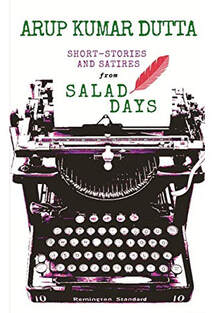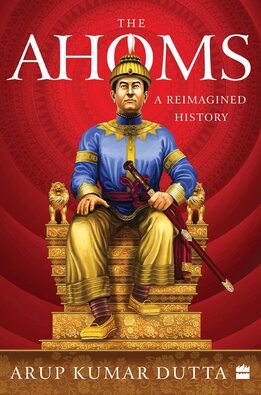
The Ahoms : A Reimagined History
Publisher: HarperCollins
Year: 2022
In 1228 A.D. an event occurred in the northeastern region of India, which not only changed the destiny of the Brahmaputra Valley and the surrounding mountains, but also of South East Asia. A group of Shan or Tai warriors, led by a brave leader named Sukapha, having left its original home in the Shan country in Myanmar, entered Upper Assam and set up the nucleus of what was later to become the powerful Ahom Empire. From the time Sukapha entered this region till it was annexed by the British in 1826, for nearly six centuries, his descendants reigned over a greater part of the Brahmaputra valley. Few dynasties in the world, let alone Asia, had enjoyed such a long period of almost unbroken rule. It was primarily due to the Ahom dynasty that the pre-colonial Assamese nation was born. Its reign witnessed the synthesis of the disparate tribes inhabiting the Brahmaputra Valley and the evolution of a distinct Assamese language, culture and nationalist identity. The Ahom Dynasty was one of the greatest political entities in medieval Asia, equal if not greater than the more well known counterparts in China or Japan. Its history is replete with tales of war, bravery, brutality, love, loyalty, treachery and treason. This book, The Ahoms, seeks to imaginatively acquaint readers with the saga of this fascinating dynasty and provide a glimpse of the major events during its six hundred year rule.
Available on Amazon: https://amzn.to/3ViwS6X
Publisher: HarperCollins
Year: 2022
In 1228 A.D. an event occurred in the northeastern region of India, which not only changed the destiny of the Brahmaputra Valley and the surrounding mountains, but also of South East Asia. A group of Shan or Tai warriors, led by a brave leader named Sukapha, having left its original home in the Shan country in Myanmar, entered Upper Assam and set up the nucleus of what was later to become the powerful Ahom Empire. From the time Sukapha entered this region till it was annexed by the British in 1826, for nearly six centuries, his descendants reigned over a greater part of the Brahmaputra valley. Few dynasties in the world, let alone Asia, had enjoyed such a long period of almost unbroken rule. It was primarily due to the Ahom dynasty that the pre-colonial Assamese nation was born. Its reign witnessed the synthesis of the disparate tribes inhabiting the Brahmaputra Valley and the evolution of a distinct Assamese language, culture and nationalist identity. The Ahom Dynasty was one of the greatest political entities in medieval Asia, equal if not greater than the more well known counterparts in China or Japan. Its history is replete with tales of war, bravery, brutality, love, loyalty, treachery and treason. This book, The Ahoms, seeks to imaginatively acquaint readers with the saga of this fascinating dynasty and provide a glimpse of the major events during its six hundred year rule.
Available on Amazon: https://amzn.to/3ViwS6X
Fiction
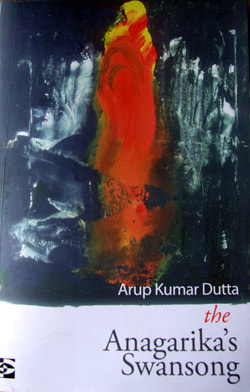
The Anagarika’s Swansong
Publisher: Anwesha
Year: 2009
Anagarika is a Sanskrit word meaning “one who goes away from society in search of truth”. The allusion is to Prince Siddhartha who abjured his princely life-style and set out in quest of existential truths to emerge as Gautama Buddha, the enlightened one. The nameless protagonist of The Anagarika’s Swansong, having failed to find a meaning in various facets of worldly life, sheds his mock-princely robes and sets out like the Prince in search of a meaning to existence. However, since his is an inferior intellect and he lives in Kaliyuga or “era of untruth”, he first lands up in the local lunatic asylum, but finally stumbles into “poor man’s enlightenment”!
Brilliantly witty, The Anagarika’s Swansong is simultaneously a satiric take off on the novel genre. While demanding a cerebral rather than emotive response, this anti-novel eschews all the conventional elements beloved of novelists, including linear narrative, structural integrity, naturalistic characterization, emotional or situational conflict et al.
Reviews:
Original Text in German Die Bunte Zeitung, Vienna
Englisch schreibenden indischen Autor Arup Kumar Dutta. Auf Deutsch: geistreich. Solche Art von Humor entsteht häufig, wenn innerliche Grenzen überzogen werden. Grenzen der Fantasie, Gre„Witty“ ist ein Schlüsselwort für den Roman „The Anagarika`s Swansong“ von dem auf nzen der Askese, Grenzen der Moral. Anagirka ist ein Wort aus dem Sanskrit; „einer der sich auf der Suche nach Wahrheit von der Gemeinschaft abwendet“. Vom Irrenhaus bis zur „Arme-Leute-Erleuchtung“ ist dieser Stoff im heutigen modernen Indien situiert. Als Parallelhandlung wird der Werdegang Buddhas beschrieben. Dutta, ein Allround-Schriftsteller – es erschien aus seiner Hand bereits ein Jugendbuch im Hanser Verlag – unterscheidet sich von anderen, international anerkannten indischen Zeitgenossen, durch die Beschreibung eines Indiens aus seinem tiefen Innenleben heraus. Von diesem Ausgangspunkt heraus gleicht sein Geist einem Flughafen von Ideen und Empfindungen, von wo aus schließlich alles möglich ist. „The souse who dwelt in a tree-house was another, though only those of us with child-sight knew it. “ Ein morgenländischer J. Joyce, ein 430 Seiten dichtbedrucktes Pedant zu Ulysses. Und randvoll beneidenswert von inneren Optimismus strotzend – trotz allem.
English Translation
“Witty” is the keyword of the novel The Anagarika’s Swansong by the English writing author Arup Kumar Dutta. It is rich in spirit. Such kind of humour comes into being when inner boundaries are crossed --- boundaries of fantasy, limits of ascetism, bounds of morals. Anagarika is a Sanskrit word which means someone who is in search of truth and thereby turns away from society. From lunatic asylum to poor man’s enlightenment, the background of this book is set in modern India. The narration parallels the life-story of Buddha. Dutta, an all round writer, already has a book for young people published in German by Hanser Verlag. He differs from his other internationally recognised Indian contemporaries through his description of an India that comes out of from the depth of his deep inner life. From this point of departure, his spirit lets loose a whole flurry of ideas and emotions, from where eventually everything is possible.
He is a J. Joyce of the East. A 430 paged book densely printed equivalent to Ulysses. The book is filled with enviable inner optimism, despite everything else --- Die Bunte Zeitung, Vienna
‘A satirical take-off on the novel genre...’ India Today
‘A journey through a volley of alliterations and cryptic chapters that “need a cerebral response”.’ Hindustan Times
"The Anagarika’s Swansong by Arup Kumar Dutta is totally unlike anything he has written before, mainly because the genre is different. But the work also stands tall and proud in its uniqueness, the way serious philosophies and humour, irony and reality are melded and moulded into a seamless work. The theme itself is not, to put it mildly, an easy one to handle. The whole work is a kind of ironical parallel to the life and teachings of no less a personage than Gautama, the Buddha himself. The story is set in the present time. From these facts arise a series of tensions which have been subtly explored with irony and humour. Characters too, are paralleled, but they, also, trail below the levels of the characters they are based on, giving rise again to humorous episodes. And yet, intertwined with the humour are deep insights that make the reader pause, and force him to think.
To write on the Buddha’s life in a straight biography is difficult enough. To even attempt the kind of work that Arup Kumar Dutta has done requires a great deal of courage, study, and effort, to carry it off. And carry it off the author has, with resounding success. The lightness of touch of the whole book masks the intensive study of the Buddha’s life as well as his philosophy.
The sheer number and variety of characters that people the pages of this book are indeed breathtaking….. Each character is deeply thought out, and portrayed in the round, with motivations that ring very true. Among the memorable ones are the Loony Uncle, the Cousin Companion, the Dissolute Scholar, and indeed, many others.
As in much post-modern fiction, characters are given generic titles rather than specific names. Yet there is richness in the characterization that rises above the names merely, to endow them with a “roundness” that stems from an earlier era of storytelling. Nobody in this anti-epic is larger than life. They are not heroic, but anti-heroic, not mythical, but anti-mythical, based not on the past, but in the flawed present. Much of the reader’s delight stems from this carefully calibrated dichotomy.
The language is a revelation. Bursting with vitality, nuanced, peppered with Sanskrit and Hindi, each sentence is dense with meaning and is richly packed with a vibrant vocabulary. There are echoes and sub-echoes within the work, of thoughts, and the vessels of those thoughts, words themselves. The sentences and paragraphs are thickly textured and richly layered, the whole palimpsest a luminous compendium of thoughts spun out in glimmering nets of light.
The dialogues, sprinkled with much scatological irreverence and sexual innuendoes are indeed quite delightful. They have a ring of truth that aids the flow of the narrative. In one of the deeper moments of the novel, the protagonist begs the people to let him go. “Time and bladders wait for no man!” he says, mingling the sublime with mundane reality in a truly comic insight.
This is not a book that one can read in a hurry. It needs time to digest both the profusion of words and the bounty of thought. But in the end, the whole experience is richly rewarding for the reader" --- The Assam Tribune.
Publisher: Anwesha
Year: 2009
Anagarika is a Sanskrit word meaning “one who goes away from society in search of truth”. The allusion is to Prince Siddhartha who abjured his princely life-style and set out in quest of existential truths to emerge as Gautama Buddha, the enlightened one. The nameless protagonist of The Anagarika’s Swansong, having failed to find a meaning in various facets of worldly life, sheds his mock-princely robes and sets out like the Prince in search of a meaning to existence. However, since his is an inferior intellect and he lives in Kaliyuga or “era of untruth”, he first lands up in the local lunatic asylum, but finally stumbles into “poor man’s enlightenment”!
Brilliantly witty, The Anagarika’s Swansong is simultaneously a satiric take off on the novel genre. While demanding a cerebral rather than emotive response, this anti-novel eschews all the conventional elements beloved of novelists, including linear narrative, structural integrity, naturalistic characterization, emotional or situational conflict et al.
Reviews:
Original Text in German Die Bunte Zeitung, Vienna
Englisch schreibenden indischen Autor Arup Kumar Dutta. Auf Deutsch: geistreich. Solche Art von Humor entsteht häufig, wenn innerliche Grenzen überzogen werden. Grenzen der Fantasie, Gre„Witty“ ist ein Schlüsselwort für den Roman „The Anagarika`s Swansong“ von dem auf nzen der Askese, Grenzen der Moral. Anagirka ist ein Wort aus dem Sanskrit; „einer der sich auf der Suche nach Wahrheit von der Gemeinschaft abwendet“. Vom Irrenhaus bis zur „Arme-Leute-Erleuchtung“ ist dieser Stoff im heutigen modernen Indien situiert. Als Parallelhandlung wird der Werdegang Buddhas beschrieben. Dutta, ein Allround-Schriftsteller – es erschien aus seiner Hand bereits ein Jugendbuch im Hanser Verlag – unterscheidet sich von anderen, international anerkannten indischen Zeitgenossen, durch die Beschreibung eines Indiens aus seinem tiefen Innenleben heraus. Von diesem Ausgangspunkt heraus gleicht sein Geist einem Flughafen von Ideen und Empfindungen, von wo aus schließlich alles möglich ist. „The souse who dwelt in a tree-house was another, though only those of us with child-sight knew it. “ Ein morgenländischer J. Joyce, ein 430 Seiten dichtbedrucktes Pedant zu Ulysses. Und randvoll beneidenswert von inneren Optimismus strotzend – trotz allem.
English Translation
“Witty” is the keyword of the novel The Anagarika’s Swansong by the English writing author Arup Kumar Dutta. It is rich in spirit. Such kind of humour comes into being when inner boundaries are crossed --- boundaries of fantasy, limits of ascetism, bounds of morals. Anagarika is a Sanskrit word which means someone who is in search of truth and thereby turns away from society. From lunatic asylum to poor man’s enlightenment, the background of this book is set in modern India. The narration parallels the life-story of Buddha. Dutta, an all round writer, already has a book for young people published in German by Hanser Verlag. He differs from his other internationally recognised Indian contemporaries through his description of an India that comes out of from the depth of his deep inner life. From this point of departure, his spirit lets loose a whole flurry of ideas and emotions, from where eventually everything is possible.
He is a J. Joyce of the East. A 430 paged book densely printed equivalent to Ulysses. The book is filled with enviable inner optimism, despite everything else --- Die Bunte Zeitung, Vienna
‘A satirical take-off on the novel genre...’ India Today
‘A journey through a volley of alliterations and cryptic chapters that “need a cerebral response”.’ Hindustan Times
"The Anagarika’s Swansong by Arup Kumar Dutta is totally unlike anything he has written before, mainly because the genre is different. But the work also stands tall and proud in its uniqueness, the way serious philosophies and humour, irony and reality are melded and moulded into a seamless work. The theme itself is not, to put it mildly, an easy one to handle. The whole work is a kind of ironical parallel to the life and teachings of no less a personage than Gautama, the Buddha himself. The story is set in the present time. From these facts arise a series of tensions which have been subtly explored with irony and humour. Characters too, are paralleled, but they, also, trail below the levels of the characters they are based on, giving rise again to humorous episodes. And yet, intertwined with the humour are deep insights that make the reader pause, and force him to think.
To write on the Buddha’s life in a straight biography is difficult enough. To even attempt the kind of work that Arup Kumar Dutta has done requires a great deal of courage, study, and effort, to carry it off. And carry it off the author has, with resounding success. The lightness of touch of the whole book masks the intensive study of the Buddha’s life as well as his philosophy.
The sheer number and variety of characters that people the pages of this book are indeed breathtaking….. Each character is deeply thought out, and portrayed in the round, with motivations that ring very true. Among the memorable ones are the Loony Uncle, the Cousin Companion, the Dissolute Scholar, and indeed, many others.
As in much post-modern fiction, characters are given generic titles rather than specific names. Yet there is richness in the characterization that rises above the names merely, to endow them with a “roundness” that stems from an earlier era of storytelling. Nobody in this anti-epic is larger than life. They are not heroic, but anti-heroic, not mythical, but anti-mythical, based not on the past, but in the flawed present. Much of the reader’s delight stems from this carefully calibrated dichotomy.
The language is a revelation. Bursting with vitality, nuanced, peppered with Sanskrit and Hindi, each sentence is dense with meaning and is richly packed with a vibrant vocabulary. There are echoes and sub-echoes within the work, of thoughts, and the vessels of those thoughts, words themselves. The sentences and paragraphs are thickly textured and richly layered, the whole palimpsest a luminous compendium of thoughts spun out in glimmering nets of light.
The dialogues, sprinkled with much scatological irreverence and sexual innuendoes are indeed quite delightful. They have a ring of truth that aids the flow of the narrative. In one of the deeper moments of the novel, the protagonist begs the people to let him go. “Time and bladders wait for no man!” he says, mingling the sublime with mundane reality in a truly comic insight.
This is not a book that one can read in a hurry. It needs time to digest both the profusion of words and the bounty of thought. But in the end, the whole experience is richly rewarding for the reader" --- The Assam Tribune.
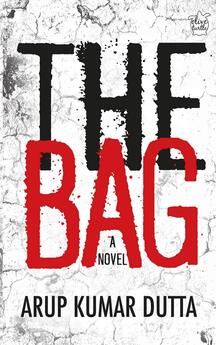
The Bag
Publisher: Niyogi Books
Year: 2018
The Bag zooms in on one of the all too many poignant mini-dramas that are played out in the conflict zones of North-East India, where no one wins. Senior police inspector Lahiri, with his pastiche dispassion and pretend cynicism, the dreaded United Liberation Front of Assam (ULFA) Hiren Bora, and his 12-year old brother Okon, each of them a victim of their circumstances quite not to their own making, portrayed with startling realism. The novel probes the psyche of a morally righteous village youth with strong ideals and big dreams, compassionately delineates his transformation into a militant, and explores the complexities that exists between him and his adolescent younger brother.
The tale unfolds at a lethargic pace, though occasionally punctuated with short and furious bursts of violent action, leading inexorably to a dramatic climax.
Review
“Author Arup Kumar Dutta meticulously arranges the chessboard keeping in mind the hierarchy in power and the vulnerability of individuals in his new novel The Bag. The novel is set in the backdrop of insurgency-hit Assam and a precarious political situation both in the state and at the Centre. The Lilliputian characters against the Goliath state fight their already lost battles in the hope that someday justice would be meted out.
Ethics, integrity, emotions and above all trust, have no place in the struggle --- that of Hiren Bora, Okon and Inspector Lahiri….. Bora knows that “pygmy revolutionaries” have no future and martyrdom is a farce and he yet marches forward leaving behind a loving family and a brother who worships him and is ready to risk everything in order to bring Bora back to the life of lesser mortals….. The high-handedness of the army, the spineless police system, battered souls in Devil’s cage and the common man’s silent cry for life make The Bag a real story. As Dutta commingles layers of emotions and brings the three characters to a crossroad, he exposes a system that plays a crooked game and boasts in make-believe victory….. “The transient nature of dogma ensured that revolutionaries and their revolutions were impermanent --- like everything else in the universe; martyrs appeared to Hiren Bora to be mere jackasses willing to sacrifice their lives for what they deemed to be a ‘cause’,” writes Dutta. But the ‘cause’ always sublimes and ‘comrades’ turn into ‘tragic figures’.
“The story of Bora, Okon and Lahiri is a reflection of the socio-politico-economic convulsions which the country has experienced time and again in the post colonial era. People like them can be jettisoned at will so that the system grows stronger…..the book keeps one on tenterhooks, especially as it nears the end and one is compelled to think whether staying in one’s cocoon and making truce with the crooked system is the only way to survive.” Shillong times
Publisher: Niyogi Books
Year: 2018
The Bag zooms in on one of the all too many poignant mini-dramas that are played out in the conflict zones of North-East India, where no one wins. Senior police inspector Lahiri, with his pastiche dispassion and pretend cynicism, the dreaded United Liberation Front of Assam (ULFA) Hiren Bora, and his 12-year old brother Okon, each of them a victim of their circumstances quite not to their own making, portrayed with startling realism. The novel probes the psyche of a morally righteous village youth with strong ideals and big dreams, compassionately delineates his transformation into a militant, and explores the complexities that exists between him and his adolescent younger brother.
The tale unfolds at a lethargic pace, though occasionally punctuated with short and furious bursts of violent action, leading inexorably to a dramatic climax.
Review
“Author Arup Kumar Dutta meticulously arranges the chessboard keeping in mind the hierarchy in power and the vulnerability of individuals in his new novel The Bag. The novel is set in the backdrop of insurgency-hit Assam and a precarious political situation both in the state and at the Centre. The Lilliputian characters against the Goliath state fight their already lost battles in the hope that someday justice would be meted out.
Ethics, integrity, emotions and above all trust, have no place in the struggle --- that of Hiren Bora, Okon and Inspector Lahiri….. Bora knows that “pygmy revolutionaries” have no future and martyrdom is a farce and he yet marches forward leaving behind a loving family and a brother who worships him and is ready to risk everything in order to bring Bora back to the life of lesser mortals….. The high-handedness of the army, the spineless police system, battered souls in Devil’s cage and the common man’s silent cry for life make The Bag a real story. As Dutta commingles layers of emotions and brings the three characters to a crossroad, he exposes a system that plays a crooked game and boasts in make-believe victory….. “The transient nature of dogma ensured that revolutionaries and their revolutions were impermanent --- like everything else in the universe; martyrs appeared to Hiren Bora to be mere jackasses willing to sacrifice their lives for what they deemed to be a ‘cause’,” writes Dutta. But the ‘cause’ always sublimes and ‘comrades’ turn into ‘tragic figures’.
“The story of Bora, Okon and Lahiri is a reflection of the socio-politico-economic convulsions which the country has experienced time and again in the post colonial era. People like them can be jettisoned at will so that the system grows stronger…..the book keeps one on tenterhooks, especially as it nears the end and one is compelled to think whether staying in one’s cocoon and making truce with the crooked system is the only way to survive.” Shillong times
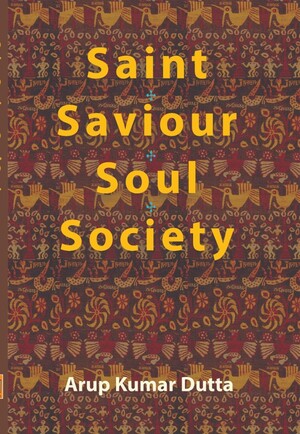
Saint; Saviour; Soul; Society
Publisher: Assam Book Hive
Year: 2024
Saint; Saviour; Soul; Society is an imaginative depiction of the life, teachings and legacy of Mahapurush Srimanta Sankardev, saint poet of Assam, the greatest individual this part of India has ever produced. Though written in a story telling style, the book is accurately based on material gleaned from various treatises by erudite scholars as well as the Charit-Puthis or biographies written on the saint.
Mahapurush Srimanta Sankardev made seminal impact on the formation and development of Assamese Society and socio-cultural development of the region.During the mid-15th century a pall of spiritual darkness had settled over the land, so much so that it became notorious to the outside world as the land of sorcery and black magic. It was at this critical juncture that Mahapurush Srimanta Sankardev, saviour of our souls and our society was born (1449 CE) to rid Assam of the prevailing degradation, bring about religious reform and usher in a socio-cultural renaissance. Ekasaran Namdharma, a religion of universal love and tolerance was the greatest gift given by him to Assamese society and forms the bulwark of the legacy that he left behind.
The Mahapurush was a great orator and an evangelist, a poet, translator, lyricist, singer, music composer, dancer, choreographer, painter, sculptor, dramatist, thespian, creator of stage props and techniques, artisan, weaver, craftsman and much else.
Saint; Saviour; Soul; Society attempts to familiarize readers with this multi-talented personality who can be counted among the greatest religious propagators and social reformers India has ever produced.
Publisher: Assam Book Hive
Year: 2024
Saint; Saviour; Soul; Society is an imaginative depiction of the life, teachings and legacy of Mahapurush Srimanta Sankardev, saint poet of Assam, the greatest individual this part of India has ever produced. Though written in a story telling style, the book is accurately based on material gleaned from various treatises by erudite scholars as well as the Charit-Puthis or biographies written on the saint.
Mahapurush Srimanta Sankardev made seminal impact on the formation and development of Assamese Society and socio-cultural development of the region.During the mid-15th century a pall of spiritual darkness had settled over the land, so much so that it became notorious to the outside world as the land of sorcery and black magic. It was at this critical juncture that Mahapurush Srimanta Sankardev, saviour of our souls and our society was born (1449 CE) to rid Assam of the prevailing degradation, bring about religious reform and usher in a socio-cultural renaissance. Ekasaran Namdharma, a religion of universal love and tolerance was the greatest gift given by him to Assamese society and forms the bulwark of the legacy that he left behind.
The Mahapurush was a great orator and an evangelist, a poet, translator, lyricist, singer, music composer, dancer, choreographer, painter, sculptor, dramatist, thespian, creator of stage props and techniques, artisan, weaver, craftsman and much else.
Saint; Saviour; Soul; Society attempts to familiarize readers with this multi-talented personality who can be counted among the greatest religious propagators and social reformers India has ever produced.
|
Short Stories and Satires from Salad Days
Publisher: Purbanchal Prakash Year: 2021 When, in the 1970s, acclaimed author Arup Kumar Dutta began his writing career, there were very few avenues for the publishing of English writing. The global space technology like the internet provides today was absent Apart from a few publishing houses, very picky in what they publish, located far away, there were a handful of magazines, brought out from Delhi, Mumbai, Calcutta, etc. such as The Illustrated Weekly of India, Shankar's Weekly, Camvan, JS, Femina, Eve's Weekly, Women's Era and Youth Times. Because these were just a few droplets in the ocean that was India, the competition to get something published in them was fierce. By dint of prolonged effort, Arup Kumar Dutta succeeded in getting his short stories and pieces of satire published at a national level. This book is a compilation of some of those short stories and satires published during the author's salad days. Also included are specimens of his pioneering satiric column, titled Columnus Venomous under the penname of Scorpion. Though a product of his earlier period, these short stories and satires retain their vivacity and universality even in contemporary times. |
